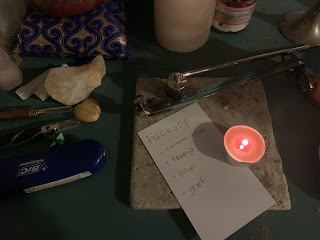The Witch, A Book Review
I finally finished reading The Witch, and let me tell you, it has enhanced my perspective of the craft. 😺
First, the nitty gritty out of the way, this is an academic book, not a "how to be a cool teen witch in the new millennium, by purchasing lots of crystals and praying to the fairies" book. As such, the author; Professor Ronald Hutton, assumes that you have some type of knowledge on the history of witchcraft, not the actual practice, but more in terms of anthropological information. He is British and for me, as someone who speaks American English, it took a while to get used to his writing pattern. However, if you've ever seen him in a documentary, and have his voice in your head, which is a leisurely and steady manner of speaking, then you can read it with more ease.
Secondly, with that out of the way, I have come away with the following:
That all cultures have some form or another of Witchcraft. It seems to be the one thing that unifies all of humanity! 💪
Now, in this world of academia, the definition of a witch will probably piss off the fluffy 🐰 Wiccans and I'm not sorry. A witch is a person who uses magic to cause harm to someone else. Point blank. "An' it harm none" simply does not pertain to professors in this subject.
Here are some select tidbits I picked up that I really didn't know:
Catholic priests would perform the workings in ceremonial magick books until the wave of witch hunts began.
We have the Jews to thank for demons and 😈 and all that nonsense. They invented them, it wasn't the Christians.
The ancient Greeks, although famous for their curse tablets, didn't like what they called magicians who had various names based on technique used. They didn't even have a word for witchcraft. Instead they had the words agurtes, goēs, epoidos, mantis, magos, pharmakeis and rhizotomoi. Magic and pharmacy are still used today.
Ceremonial magick is a mix of Egyptian and Jewish practices. While the deities summoned are of the Hebrew variety, the rituals are very much Egyptian (who loved a lot of pomp and circumstance).
Regardless of how much a population feared witchcraft, they still sought out the magicians, or witches for whatever workings they needed done.
Shamanism is a Siberian construct. One always thinks of Native Americans being Shamans and they aren't.
The pentagram is still confusing historians. There is no conclusive evidence that it was ever used strictly as protection or for magick. They have found it everywhere, however, it could have just been a decoration as it's been used so often without any explanation in various cultures.
Of course there is so much more to this book than the above random facts. Hutton traces Witchcraft across the continents and through time forming a cohesive and definitive image of the witch. He discusses the differences across cultures as well as the similarities. Even the words we use today for 'witch' have an origin, like strix in Rome and how it evolved into today's strega.
Overall, I enjoyed this book immensely. I feel that if you're a serious student of Witchcraft that you really should delve into the history books, not just the "how to cast a circle" books. Putting your beliefs and practices into a historical context with a timeline and learning about the actual origins of it all can really solidify everything for you.
Personally, I want to know where what I believe comes from. How our ancestors worked magick, what was being used or said. The Egyptians left a vast amount of texts and anecdotes from their day to day lives. We have this information at our disposal. Soon medieval manuscripts will be digitized for us courtesy of author Dan Brown.
Witchcraft wasn't and still isn't a mystery to be kept hidden, this was how our ancestors got through their day to day lives. Whether a wife's husband couldn't get his dick up or got another woman pregnant and she wanted to end it to spite him or her cousin had a simple toothache. Witchcraft helped all of those things.
We're human, we do bad things. There cannot be good in the word without bad. Empathetic people invented morals, we now have laws against "bad" things, but if you've studied the Bible, then you know, humans are some fucked up primates.
For every bad spell that was cast on a person, there was always a spell to counteract it.
Balance.
Just go read this book. Trust me.
Happy Reading!
📄📚📓📕📖📜📑



Comments
Post a Comment